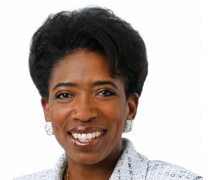

Once you’ve figured out who has a seat at the table and who has visibility into your work, you pick two or three people that you start to build a relationship with hopes a sponsor relationship will naturally form.
#Carla harris morgan stanley how to
How to find a sponsorĬH: The best way to find a sponsor is to study your organization for two weeks and observe who has a seat at the decision-making table, who does not have a seat at the table, but has influence with those decision-makers, and who are the toxic people you want nothing to do with. Second, they need to have a seat at the decision-making table, and third, they need to have the power to get - whatever it is - done. First, they need to have some visibility into your work because they have to have credibility behind closed doors when they speak on your behalf. On the other hand, a sponsor needs to be in your organization. The important thing is they know you very well and understand the context that you’re working in, so they can give you tailored advice you can successfully execute. Mentors don’t have to be within your organization. Those light touches are the things that help you build a relationship in an environment. For example - you see someone in the elevator all the time and you strike up a conversation, or you stop by someone’s desk and ask what they have planned for the weekend. In the corporate environment, it can be light touches, meaning interactions. Just like in your personal life, you build and nurture relationships over time. Nurturing mentorship and sponsorship relationshipsĬH: Building relationships is simply a function of the frequency of touch. Carla Harris speaking at a digital transformation conference. Just work really hard, put those points on the board.” And while putting the points on the board is important, what really allows you to accelerate through an organization is relationships. I also didn’t understand the power of relationships because if you’re growing up a person of color, especially as I did in the South, people said, “Keep your head down, work really hard. Use that as your leverage and as your power.ĬH: These are things I did not realize and did not know when I first started in my career. And the lower the expectations are, the more you’re going to blow them away. So all you have to do is to deliver your excellence into that expectation. Whether they act like they’re listening or not, they’re listening. You don’t have to fight to be heard because everybody’s listening. You don’t have to fight for attention because everybody’s looking. So often, I hear people of color and women say, “I’m the only one.” One of the things I’ve learned is if you’re the only one in the room that looks like you, you’re the only one in the room that looks like you. If you’re the “Only one in the room” - leverage your powerĬH: One thing I did not do throughout my career is to look at being a woman or a person of color as a liability. You certainly will take responsibility for the mistakes that are made so take responsibility for the great things you accomplish as well. If people don’t know that you did it, then how can they reward you? How can they know that you are a leader? If you’re uncomfortable taking the spotlight, then use the pronoun “we.” You can say, “Look at what we did, I’m so proud of the team, we got this done.” But you must be comfortable owning and taking responsibility for your great work. You should not feel uncomfortable about taking credit for your work. Here are some pearls of wisdom, edited for clarity, she shared: Why showing off your work is importantĬarla Harris: It’s important that you own the great things you deliver in the organization. She vowed that when she reached senior management and people came to her for advice, she would provide them with tools and strategies honed by her own experience. Harris shared that while climbing the corporate ladder, she made her own personal missteps amidst numerous victories.

The summit seeks to elevate and amplify the voices of Black, Latinx, Indigenous, and LGBTQ+ community leaders who are not only making space for others but also changing the spaces they are in for the better. Harris spoke at Representation Matters, our fourth annual racial equality summit in July, where she shared some of her best career advice. Whether I’m singing on a stage, speaking or counseling and advising in an investment banking capacity - it’s all about delivering my best.” “Part of my purpose is always about delivering excellence no matter what I’m doing. She went from a first-year associate in recruiting at an investment bank, to now vice chairman and managing director at Morgan Stanley. Harris started her successful career more than 30 years ago on Wall Street, as one of the only Black women in the industry at that time.


 0 kommentar(er)
0 kommentar(er)
